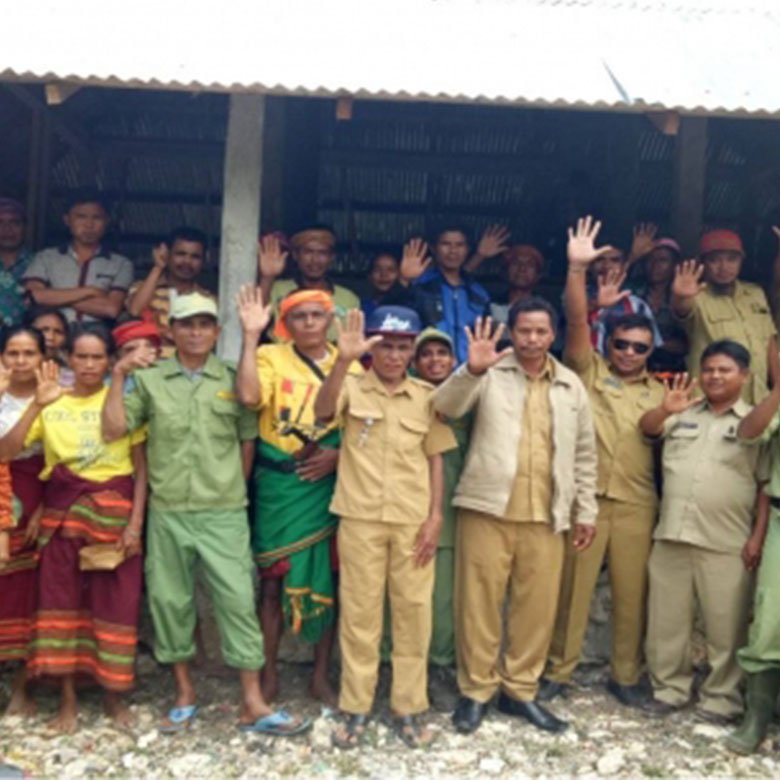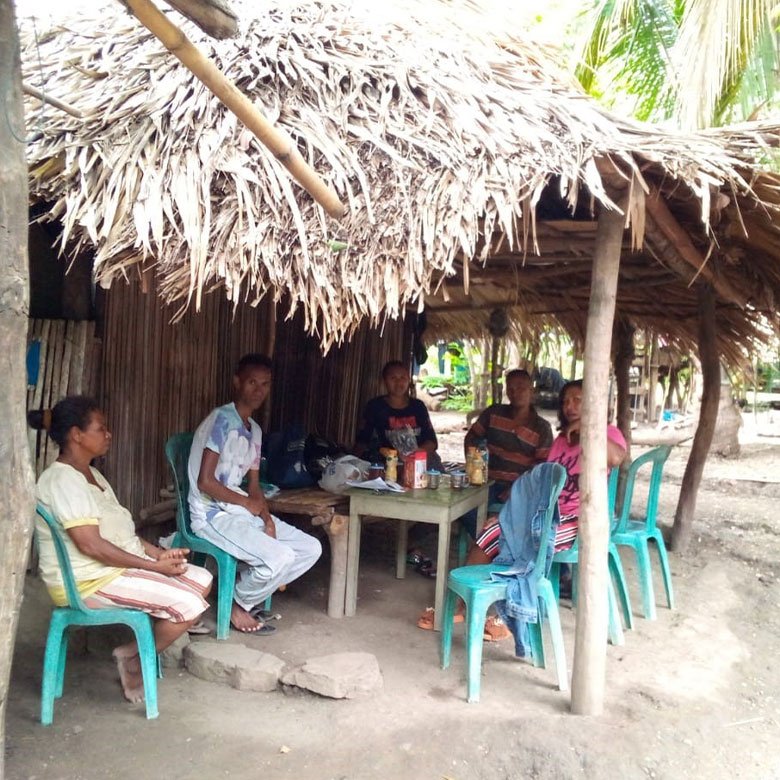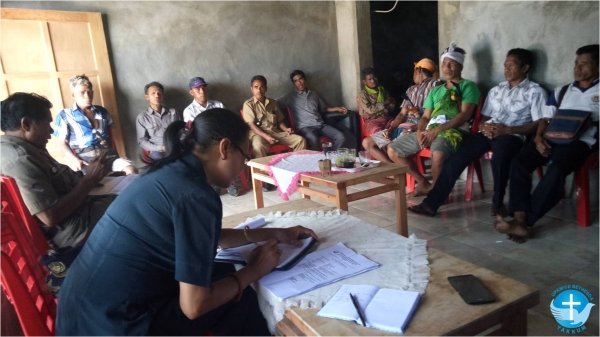
Post-Monitoring Assistance for CLTS in Southwest Sumba
February 14, 2022
Strengthen Your Identity, Realize Your Dreams
June 2, 2022ACTIVE ROLE OF WSES WORKING GROUP OF EAST WEWEWA AND SUCCESS OF VILLAGE CLTS
The hard work of the Water Supply and Environmental Sanitation (WSES) Working Group of Wewewa Timur District, Southwest Sumba Regency, to improve community sanitation conditions through the Community-led Total Sanitation (CLTS) strategy has not been in vain. This is evident from the achievement of ownership of sanitation facilities and changes in clean living behavior in the sub-district area. As of September 2017, there are already 3 villages that have achieved 95 – 100% of the 5 pillars of CLTS indicators.
Since its establishment in June 2017 based on the Camat Decree number 4 of 2017, the Wewewa Timur District WSESWorking Group has directly conducted education, technical assistance, monitoring and evaluation and continuous coordination to achieve changes in sanitation and clean living behavior in the
community. This achievement is also inseparable from the active role and joint work with the Village STBM Team. “Regular coordination between WSES Working Group Kecamatan Wewewa Timur and the Village regarding STBM progress, constraints and recommendations on an ongoing basis is the key to success in achieving sanitation and clean living behavior,” said Thimotius B. Lero, SE as Camat Wewewa Timur.
Furthermore, Thimotius said that members of the WSES Working Group, which consists of cross-sectors such as Puskesmas, Kecamatan, Polsek, Babinsa and School Supervisors, have been working together to improve sanitation in the community. For example, although technically the activities of the WSES Working Group are carried out by the Kecamatan Secretary, David Bobo, and the Head of the PMD Section, Martinus S. Lende, Sanitarian of the Elopada Health Center, Sarniati, they still have to cooperate with village officials and village STBM cadres. This is because it is the local villagers who fully understand the character of their village community.
This series of STBM approach activities began with triggering in the three target villages. Triggering in Dikira Village was conducted in January-February 2017, in Nyuralele Village in April-May 2017, and in Dedepada Village in May 2017. The next step is the promotion of STBM and technical assistance in
the use of 5-pillar technology, including latrines, hand washing facilities, drinking water treatment facilities, waste safety and wastewater safety in households and public facilities.
When monitoring the 5 pillars of STBM was conducted in each household in June 2017, there had been changes and improvements in sanitation facilities, but there were still some households that did not have toilets or other sanitation facilities. Therefore, in August 2017 the WSES Working Group initiated a coordination meeting with the village government to design a strategy to accelerate STBM.
The coordination meeting agreed on several recommendations for the Kecamatan WSES Working Group, including: First, the WSES Working Group should monitor the acceleration of STBM in the village by asking the commitment of the village head, hamlet head and RT/RW to complete the 5 pillars of STBM. Second, ask the village to create a small team in the hamlet to assist and monitor STBM activities at the hamlet level. Thirdly, emphasizing to the village to provide social support to people in the widow, widower and poor categories. Fourth, the sub- district will not provide recommendations for taking Rastra (Prosperous Rice) until the village has achieved 100% of the 5 pillars of STBM. In this case, Rastra remains the right of villagers, but is only temporarily suspended until all have latrine facilities along with the other 4 pillars of STBM. Fifth, all
administrative services will be suspended for families who do not have sanitation facilities.
While recommendations for the village include: First, follow up on the Regent’s Instruction related to STBM Implementation in the form of Village Head instructions / Village Regulations.
Second, SKTM will not be served before the family has sanitation. Third, every household is obliged to write, “ONLY CATS DO TA’IKO WEWAR, NO HUMANS DO TA’IKO WEWAR“
(Ta’iko Wewar means open defecation). Fourth, welfare rice services will be temporarily suspended until households have toilets and the other 4 pillars.
This agreement appears to have been strictly adhered to and effective so that when the Kecamatan WSES Working Group and the Village STBM Team returned to conduct house-to- house monitoring in September 2017, there had been significant achievements. The Monitoring Team was divided into 4 groups to monitor changes in the behavior of the 5 pillars of STBM using a format that is easy to understand and measurable results. The results of monitoring the 5 pillars at the household level were recapitulated at the village level by the Village STBM Team and continued with a recap at the sub- district level by the sanitarian or WSES Working Group Kecamatan. The results of this data processing are entered into an on-line- based monitoring system through the M-Water program by the Puskesmas sanitarian. Thus, it will be easier for the parties to monitor changes in sanitation improvement and clean living behavior in the community.

Hasil pemantauan di tiga desa sasaran menunjukkan telah tercapai 100% kepemilikan jamban di setiap rumah. Di desa Dikira dari 260 rumah ada 20 rumah yang membangun jamban leher angsa, 46 rumah membangun jamban plengsengan dan 194 rumah membangun jamban cemplung. Di desa Nuralele dari 225 rumah ada 35 rumah yang membangun jamban leher angsa, 51 rumah membangun jamban plengsengan dan 139 rumah membangun jamban cemplung. Sedangkan di Desa Dedepada dari dari 187 rumah ada 47 rumah yang membangun jamban leher angsa, 119 rumah membangun jamban plengsengan dan 21 rumah membangun jamban cemplung.
Sedangkan untuk indikator kepemilikan sarana CTPS, di Desa Dikira sudah semua rumah (260 unit) yang memiliki sarana CTPS, air, sabun dan tahu cara dan waktu menggunakannya. Di desa Dedepada dari 187 rumah, sudah 100% memiliki sarana CTPS, air, sabun dan tahu cara dan waktu menggunakannya. Sementara di Desa Nyuralele, dari 225 rumah, masih terdapat 113 rumah yang belum memiliki sarana CTPS dan 109 rumah sudah memiliki sarana CTPS dan air.
Kini ketiga desa di Kecamaan Wewewa Timur telah meraih 100% stop BABS dan perlu upaya sedikit lagi untuk mencapai 100% STBM 5 pilar. Mengingat kelima pilar STBM merupakan kebutuhan dasar setiap rumah tangga, baik di desa maupun di perkotaan dan Kabupaten Sumba Barat sudah pernah mencapai deklarasi Desa STBM 5 pilar tahun 2014-2015, Pokja AMPL Kecamatan optimis untuk bisa melakukan deklarasi desa STBM pada November 2017.
“Melalui Deklarasi Desa STBM merupakan bentuk apresiasi pemerintah kabupaten atas partisipasi masyarakat dan pemerintah desa dalam mewujudkan perbaikan sanitasi dan perilaku hidup bersih,” ungkap Thimotius B. Lero.
Selaku Camat, dia berharap desa-desa lainnya juga akan mengikuti jejak keberhasilan STBM hingga Kecamatan Wewewa Timur bisa mencapai 100% STBM Tingkat Kecamatan. “Keberhasilan yang dicapai saat kini masih baru memenuhi standar minim sanitasi sehingga diharapakan ke depan akan terus melangkah menuju sanitasi layak dan dimanfaatkan secara maksimal oleh semua masyarakat,” pungkasnya. Semoga…

